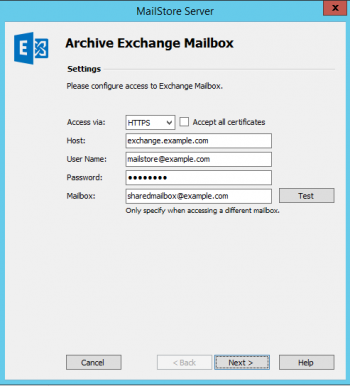Difference between revisions of "Template:Archiving Exchange Shared Mailbox"
| [unchecked revision] | [quality revision] |
m |
|||
| (9 intermediate revisions by 2 users not shown) | |||
| Line 1: | Line 1: | ||
| − | |||
Shared mailboxes grant multiple users shared access to a mailbox, somewhat comparable to public folders. | Shared mailboxes grant multiple users shared access to a mailbox, somewhat comparable to public folders. | ||
| − | + | === Step 1: Creating a MailStore User for a Shared Mailbox === | |
| − | === | + | {{#ifeq: {{{1}}}|Office 365|A shared mailbox is a special kind of mailbox that, unlike a normal mailbox, is associated with an Azure AD account that has no Microsoft Exchange Online license assigned to it. Like for normal mailboxes, MailStore is able to create user entries for shared mailboxes via [[Office_365_Integration|Azure AD synchronization]]. For this, you have to deactivate the option ''Synchronize licensed Microsoft Exchange Online users only'' in the section [[Office_365_Integration#User_Database_Synchronization|User Database Synchronization]].|A shared mailbox is a special kind of mailbox that, unlike a normal mailbox, is associated with a disabled Active Directory account. Like for normal mailboxes, MailStore is able to create user entries for shared mailboxes via [[Active_Directory_Integration|Active Directory Synchronization]]. For this, you have to deactivate the option ''Synchronize enabled users only'' in the section [[Active_Directory_Integration#User_Database_Synchronization|User Database Synchronization]].}}<br/> |
| − | A shared mailbox is a special kind of mailbox | + | After synchronization you can grant MailStore users access to the archive of the shared mailbox by [[Users,_Folders_and_Settings#Folder_Access_.28e.g._Access_to_the_Emails_of_Other_Users.29|assigning privileges]]. |
| − | After synchronization you can grant MailStore | + | === Step 2: Setting up the Archiving Process === |
| − | + | {{#ifeq: {{{1}}}|Office 365|Further steps are analog to the archiving of <includeonly>[[#Archiving_Individual_Office_365_Mailboxes|individual]] or [[#Archiving_Multiple_Office_365_Mailboxes_Centrally|multiple]] Office 365 mailboxes</includeonly><noinclude>archiving of individual or multiple Office 365 mailboxes</noinclude>.|In order to archive emails from a shared mailbox you must grant a user account full access to that mailbox (either by delegated access or impersonation) because the Active Directory user account associated with that mailbox is disabled. You can use the <includeonly>[[#Step 1: Setting up a service account for accessing mailboxes|service account]]</includeonly><noinclude>service account</noinclude> you created to archive multiple mailboxes for this purpose. | |
| − | === Archiving | ||
| − | In order to archive emails from a shared mailbox you must grant a user account full access to that mailbox (either by delegated access or impersonation) because the Active Directory user account associated with that mailbox is disabled. You can use the | ||
Once you have created the service account, setup a new ''Single Mailbox'' archiving profile. Enter the credentials of the service account and fill the optional ''Mailbox'' field with the primary e-mail address of your shared mailbox. | Once you have created the service account, setup a new ''Single Mailbox'' archiving profile. Enter the credentials of the service account and fill the optional ''Mailbox'' field with the primary e-mail address of your shared mailbox. | ||
| Line 13: | Line 10: | ||
[[File:Xchg_sharedmbx_01.png|center|350px]] | [[File:Xchg_sharedmbx_01.png|center|350px]] | ||
| − | Further steps are analog to the archiving of individual Exchange mailboxes. | + | Further steps are analog to the <includeonly>[[#Archiving Individual Mailboxes|archiving of individual Exchange mailboxes]]</includeonly><noinclude>archiving of individual Exchange mailboxes</noinclude>.}} |
| + | <noinclude> | ||
| + | [[de:Vorlage:Archivierung Exchange Freigegebenes Postfach archivieren]] | ||
| + | [[en:Template:Archiving Exchange Shared Mailbox]] | ||
| + | </noinclude> | ||
Revision as of 10:31, 8 November 2016
Shared mailboxes grant multiple users shared access to a mailbox, somewhat comparable to public folders.
A shared mailbox is a special kind of mailbox that, unlike a normal mailbox, is associated with a disabled Active Directory account. Like for normal mailboxes, MailStore is able to create user entries for shared mailboxes via Active Directory Synchronization. For this, you have to deactivate the option Synchronize enabled users only in the section User Database Synchronization.
After synchronization you can grant MailStore users access to the archive of the shared mailbox by assigning privileges.
Step 2: Setting up the Archiving Process
In order to archive emails from a shared mailbox you must grant a user account full access to that mailbox (either by delegated access or impersonation) because the Active Directory user account associated with that mailbox is disabled. You can use the service account you created to archive multiple mailboxes for this purpose.
Once you have created the service account, setup a new Single Mailbox archiving profile. Enter the credentials of the service account and fill the optional Mailbox field with the primary e-mail address of your shared mailbox.
Further steps are analog to the archiving of individual Exchange mailboxes.

